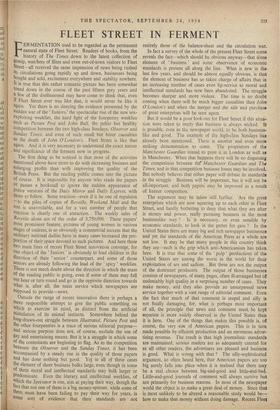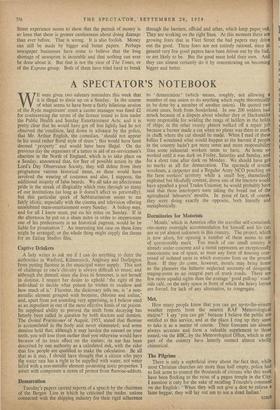FLEET STREET. IN FERMENT
FERMENTATION used to be regarded as the permanent natural state of Fleet Street. Readers of books, from the history of The Times down to the latest collection of gossip, watchers of films and even out-of-town visitors to Fleet Street—all received the same impression of news being rushed in, circulations going rapidly up and down, businesses being bought and sold, excitement everywhere and stability nowhere. It is true that this rather romantic picture has been somewhat toned down in the course of the past fifteen grey years and a few of the disillusioned may have come to think that, even if Fleet Street ever was like that, it would never be like it again. Yet there is no denying the evidence presented by the sudden war of the ` Juniors,' the spectacular rise of the new sex- exploiting weeklies, the hard fight of the fourpenny weeklies such as Picture Post and John Bull, the polite but healthy Competition between the two high-class Sundays, Observer and Sunday Times, and even of such small but bitter casualties as the death of John O'London's. Fleet Street is like that again. And it is very necessary to understand The exact nature and significance of the ferment now in progress.
The first thing to be noticed is that most of the activities mentioned above have more to do with increasing business and enlarging profits than with improving the quality of the British Press. But the reading public comes into the picture of course. It is impossible for anyone who reads the papers or passes a bookstall to igtiore the sudden appearance of junior versions of the Daily Mirror and Daily Express, with more to follow. Some reaction—even if it be one of repulsion --to the piles of copies of Reveille, Weekend Mail and the rest is unavoidable, and for a vast number of people that reaction is clearly one of attraction. The weekly sales of Reveille alone are of the order of 3.750,000. These papers' Most prominent feature, pictures of young women in various stages of undress, is so obviously a commercial success that the ordinary national dailies have in many cases increased the pro- portion of their space devoted to such pictures. And here these two main lines of recent Fleet Street innovation converge, for one object of the ` Juniors ' is obviously to lead children in the direction of their ` senior ' counterpart, and some of those seniors are already following the lead of the ` spicy' weeklies. There is not much doubt about the direction in which the mass of the reading public is going, even if some of them may fall out later or turn round and go in the opposite direction towards What is, after all, the main service which newspapers are supposed to provide—news.
Outside the range of recent innovation there is perhaps a More responsible attempt to give the public something on Which to exercise its mind, as distinct from the artificial stimulation of its animal instincts. Somewhere behind the long-drawn-out struggle between Illustrated, Picture Post and the other fourpennies is a trace of serious editorial purpose— and serious purpose does not, of course, exclude the use of gay and entertaining means. But it is a struggle in which some of the contestants are beginning to flag. As to the competition between the Observer and the Sunday Times, it has been accompanied by a steady rise in the quality of those papers and has done nothing but good. ' Yet in all of these cases the element of sheer business bulks large, even though in some of them moral and intellectual standards may bulk larger or predominate. Even the literary and intellectual weeklies, of Which the Spectator is one, aim at paying their way, though the fact that not one of them is a big money-spinner, wbile some of them must have been failing to pay their way for years, is some sort of evidence that their standards are not entirely those of the balance-sheet and the circulation war.
In fact a survey of the whole of the present Fleet Street scene reveals the fact—which should be obvious anyway—that some element of ` business ' and some observance of economic standards is preient all along the line. What is new in tho last few years, and should be almost equally obvious, is that the element of business has so taken charge of affairs that in an increasing number of cases even lip-service to moral and intellectual standards has now been abandoned. The struggle becomes sharper and more violent. The time is no doubt coming when there will be much bigger casualties than John O'London's and when the merger and the sale and purchase of great enterprises will be seen again.
But it would be a poor look-out for Fleet Street if this situa- tion were taken to imply that business is always wicked. It is possible, even in the newspaper world, to he both business- like and good. The example of the high-class Sundays has already been mentioned. There is another and even more striking demonstration to come. The proprietors of the Manchester Guardian intend to print it in London as well as in Manchester. When that happens there will be no disguising the competition between the' Manchester Guardian and The Times, and in that competition business losses may be involved. But nobody believes that either paper will debase its standards , in the struggle., Business will be important, but it will not be all-important; and both papers may be improved as a result of keener competition.
The argument may be taken still further. Are the great enterprises which are now squaring up to each other in Fleet Street, and hardly bothering to deny that what they are after is money and power, really pursuing business in the most businesslike way ? Is it necessary, or even sensible by economic standards, to look in the gutter for gain ? In the United States there are many big and rich newspaper businesses and yet the standards of the American Press as a whole are not low. It may be that many people in this country think they are—such is the grip which anti-Americanism has taken. here. It is true that some of the pulp' productions of the United States are among the worst in the world for their exploitation of sex and sadism. Bbt these are not the output of the dominant producers. The output of those businesses consists of newspapers, of many pages, often ill-arranged but of undeniably high quality in a surprising number of cases. They make money, and they also provide an unsurpassed news service together with a vast range of editorial comment. Even the fact that much of that comment is stupid and silly is not finally damaging, for, what is perhaps most important of all, the principle that news and comment must. be kept separate is more widely observed in the United States than it is here. One of the things that makes this possible is, of course, the very size of American papers. This is in turn made possible by 'efficient production and an enormous adver- tising revenue. The. result is that high journalistic standards are maintained, serious readers are as adequately catered for as all other readers, the advertisers are pleased and business is good. What is wrong with that ? The silly-sophisticated argument, so often heard here, that American papers are too big surely falls into place when it is realised that there may be a real choice between big-and-good and little-and-bad. Little-and-good journals of comment will always survive but not primarily for business reasons. In most of the newspaper world the object is to make a great deal of money. Since that is most unlikely to be altered a reasonable study would be— how to make that money without doing damage. Recent Fleet Street experience seems to show that the pursuit of money is so keen that there is greater carelessness about doing damage than ever before. That is wrong. It is also foolish. Money can still be made by bigger and better papers. Perhaps newspaper businesses have come to believe that the long shortage of newsprint is incurable and that nothing can ever be done about it. But that is not the view of The Tunes, or of the Express group. Both of them have tried hard to break through the barriers, official and other., which keep paper oul They are working on the right lines. At this moment there an growing fears that in Fleet Street the bad papers may drive out the good. These fears are not entirely rational, since it general very few good papers have been driven out by the had or are likely to be. But the good must hold their own. Anc they can almost certainly do it by concentrating on becoming bigger and better.



































 Previous page
Previous page